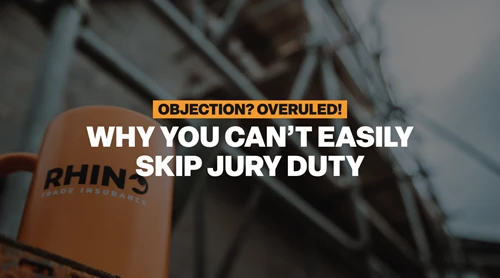Working as a trade contractor in the UK is a top career move if you’re prepared to put the graft in. Just ask the thousands of Rhino customers with thriving businesses who would never go back to working for The Man. However, working as a contractor means you must wrap your head around a complicated set of rules and regulations. One false move and you could find yourself on the wrong side of the mighty HMRC.
Know your tradesman rights, and don’t get caught out. Read on to discover the key rights and distinctions for contractors working in the UK.
Employee vs. Contractor: Understanding Your Status
It’s important to understand the definition of ‘employee’ vs ‘contractor’ before you decide to go it alone. This is because there are tax implications to classifying yourself as one or the other, with serious consequences if you get it wrong.
We’ll go into that a little later, but for now, let’s break down the definitions of each:
An ‘employee’ is someone who works for someone else on an ongoing, fixed basis. An employee will have signed a contract setting out the terms of their employment and agreeing to carry out certain duties to receive a certain renumeration (salary) in return. This is called the ‘mutuality of obligation’ and is a key defining factor of employees vs contractors under UK law. Mutuality of obligation basically means that an employee is obliged to carry out certain duties, and that the employer is obliged to pay them for it.
An employee will also have a set number of hours they will work each week. The employer has control over these and will have defined them at the point of employment. The shift patterns may change and there may be flexibility, but generally there will be a minimum number of hours contracted.
Another hallmark of an ‘employee’ is that there is no substitution allowed. Employees must do the work they’re hired to do themselves, without any substitution. They can’t hire someone else to do it, unlike a contractor who can use employees or sub-contractors.
Finally, if you’re an employee then your employer will deduct tax and National Insurance from your payments at source, leaving you with your net salary.
Unlike an employee, a contractor won’t have an ongoing contract with an employer. They don’t have regular duties but instead are hired to complete a specific project or duty. This will be clearly set out in a contract. For example, the erection of a conservatory, the laying of pipes or the installation of a lighting system. Therefore, a contractor has control over the hours they work, and doesn’t have ‘mutuality of obligation’. Someone who hires a contractor is not obliged to offer them work, and a contractor is not obliged to accept any work.
As mentioned, a contractor may use others to complete the job via substitution. This could be by using apprentices, their own employees or sub-contractors. Further, contractors generally handle their own tax and National Insurance affairs.
Employee vs Contractor – What Does it Matter?
Which you’re legally defined as is important because it affects your tax obligations and employment rights. For example, if you’re operating as an independent contractor, you will need to withhold your own tax and National Insurance contributions, complete an annual Self-Assessment and potentially register for VAT if you earn above a certain threshold. Similarly, if you’re registered as a limited company, you’ll also need to register for Corporation Tax and VAT and submit accounts quarterly. You will also need to register for the Construction Industry Scheme (CIS) if you’re a contractor in the building trade.
As an employee, you don’t need to worry about these things as your employer will take your tax and National Insurance from you at source, and the CIS doesn’t apply.
In terms of employment rights, employees and contractors are two totally different animals. Employees benefit from legal rights in the workplace including:
- National Minimum Wage
- Statutory sick pay
- Paid breaks
- Legal protection from discrimination
- Whistleblower’s protection
- Paid leave
Contractors don’t have any of the above entitlements under law. However, for most contractors, the trade-off is worth it. Contractors get to earn uncapped income, choose the working hours that suit them and only take on projects they want to, making it the right choice for many despite the disadvantages.
So, What’s a Worker Then?
There is a third category of employment status you should know about, known as ‘worker’ status. This is where it gets confusing, as there can be some blurring of the lines between employee, contractor and worker.
Essentially, you may be a worker if you work independently but also bear some hallmarks of an employee. For example, you could frequently work for the same company on a casual basis. To qualify as a worker, you would have agreed to terms and conditions with the business initially, the business will provide the tools and materials, and you must take direction from a manager or supervisor. Crucially, if you work for any business which deducts tax and National Insurance from your salary (even if you work as an independent contractor for other businesses), then you will likely qualify for worker status.
Don’t worry if this seems like a confusing area – it can be. If you want further advice on what your status might be, it’s a good idea to call in expert help. A good accountant specialising in the trades industries will be able to see you right. If you’re protected by Rhino Trade Insurance’s Tax Enquiry Insurance, which our customers can add to their core Public Liability Insurance cover at a low cost, expert legal help is just a phone call or email away.
The Impact of the Construction Industry Scheme (CIS) on Tradespeople
If you’re a self-employed builder or construction worker in the UK, you’ve almost certainly heard of the Construction Industry Scheme (CIS). It’s not the most popular scheme, but it’s enforceable by law so you must toe the line whatever your feelings about it are.
The CIS is a government scheme whereby contractors deduct tax and National Insurance from a subcontractor’s payments and pass it directly to HMRC as payments on account throughout the year. If you’re working as a contractor in the UK, you must be CIS-registered and file CIS returns to HMRC and CIS statements to your subcontractors monthly. If you’re a subcontractor, registering is optional, but deductions from your payments will be higher if you’re not registered.
You should also know about IR35. This is a piece of tax legislation which exists to prevent employees classifying themselves as subcontractors while working essentially as employees. IR35 has been around for a while in the UK, but it was reformed in 2021 to stop private sector contractors being able to self-declare their IR35 status. Now, it’s you as the contractor who gets to decide your subcontractor’s IR35 status. But there’s a catch – if HMRC don’t agree with your classification then – you guessed it – there’s a penalty.
Mitigating Misclassification: Ensuring Correct Employment Status
The reason that HMRC believes people would misclassify employees as subcontractors is for the tax benefits self-employment brings to both parties. Also, it might be assumed that some employers would wish to skip providing someone their statutory rights as an employee (e.g., paid leave).
Thanks to the closing of several legal loopholes, this type of tax avoidance is increasingly rare, but it does still happen. HMRC powers have increased, and penalties have become tougher, and high-profile cases like the Supreme Court ruling against Uber in 2021 have raised awareness of the ramifications of employee misclassification. (Uber drivers were officially classed as ‘employees’ rather than ‘contractors’, meaning Uber was liable to make a huge payout of a rumoured £1bn and drivers were given entitlement to worker’s rights).
Consequences of misclassification of employees as contractors are stiff for hiring entities. For one thing, you’d need to pay out of your own pocket for the income tax and National Insurance that you should have been deducting from each misclassified employee. Further, you’d have to backdate the benefits the person should have been entitled to while they were working as an ‘employee in disguise’. This means you could end up having to grant misclassified workers months of paid leave if they’ve been misclassified for several years.
As you can imagine, this could add up to a small fortune.
Be sure to regularly review your subcontractor’s work arrangements against the key definitions as outlined above. Consider whether the elements of mutuality of obligation, substitution and control are met. If you’re not sure if you’ve correctly classified your subcontractors, seek advice from an employment lawyer. Even if you do this, HMRC can disagree with your decision, so it’s a good idea to get covered with Tax Enquiry Insurance.
Financial Responsibilities: Taxes and National Insurance for Contractors
As a self-employed contractor, you will bear the responsibility of doing your own taxes. This will look slightly different depending on your business structure.
Sole Trader
If you’re operating as a sole trader, you will need to submit a Self-Assessment tax return every year. To do this accurately, you must keep back your income tax and National Insurance contributions, as well as keeping a record of your business’s income, expenditure, expenses and personal income throughout the year. If you have any employees, you must keep accurate PAYE records of what you pay and deduct. You may also choose to register for VAT – this becomes compulsory once your turnover reaches £85,000. You will need to then submit quarterly VAT returns.
Limited Company
If you become the director of your own limited company, you will need to file and submit annual accounts every year. These will include a balance sheet and profit and loss account. You will also choose an accounting period for Corporation Tax and submit a Company Tax Return after it. You will also need to register for VAT once you reach the threshold.
If your company is making a profit, you must pay dividends to the shareholders. It’s mandatory to hold a director’s meeting and produce a dividend voucher – check out the HMRC website for full details.
If you employ anyone, you must register as an employer with HMRC, and deduct Income Tax and National Insurance contributions from your employee’s salary payments. You will then need to pay these to HM Revenue and Customs (HMRC), along with employers’ National Insurance contributions.
If it all sounds like a bit of a headache, don’t worry. Most self-employed contractors work with an accountant to help take the burden of the financial side of things. Choosing an online accountancy firm like QAccounting will keep things low-cost and convenient.
Don’t forget your tax deductions and allowances. These will keep your taxable profit down, meaning you pay less tax overall. Most things you use wholly and exclusively for business use are tax deductible. For self-employed contractors, this would include the running costs of your business vehicle, your company mobile phone, uniforms, tools, equipment and even the odd client lunch!
Staying Informed: Resources for Up-to-Date Legal and Tax Information
Knowing your self-employed contractor rights as a tradesperson is important. So is staying informed, as laws and regulations change and staying on top of these changes will ensure you’re well-prepared for any legal or financial challenges that may arise. It’s a good idea to subscribe to industry press such as Contractor Weekly and On The Tools (as well as Rhino of course), so you won’t miss any updates.
And, as always, Rhino are here to help. Not only do we provide tradespeople with top-notch insurance without all the fuss, we’re also a valuable resource for tradespeople in the UK looking to understand their rights and status better. Check out our extensive blog archive for articles on everything from IR35 to the secret to making the perfect brew!




